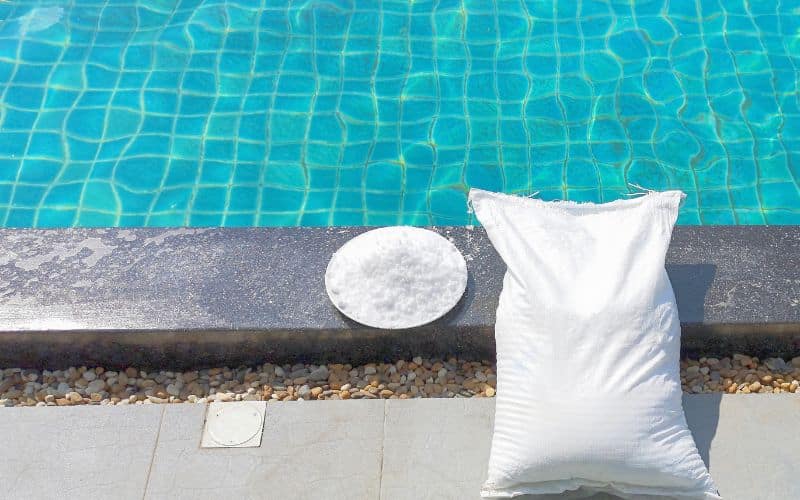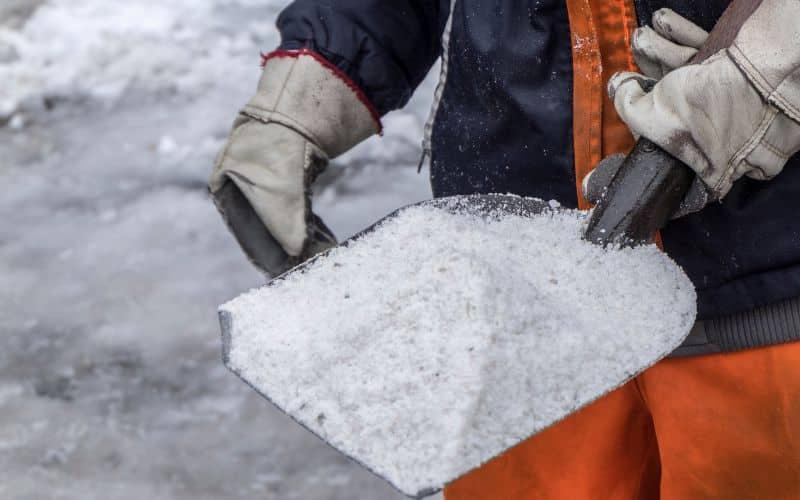
In the frosty grip of winter, you’ve probably asked yourself: will pool salt melt ice? Well, the answer is a resounding yes. Pool salt, or sodium chloride as it’s scientifically known, has long been utilised to combat icy conditions on roads and walkways.
You see, when pool salt comes into contact with ice or snow it creates a solution called brine which lowers the freezing point of water. This in turn causes any ice present to begin melting even at temperatures well below zero degrees Celsius.
But there’s more to this story than just a simple ‘yes’. The effectiveness of pool salt can vary depending on several factors including temperature and concentration level. We’ll delve deeper into these nuances further along in this article so stick around if you’re keen to become an expert on all things related to pool salt and its icy foe.
Understanding Pool Salt and Its Properties
Ever wondered about the properties of pool salt, or why it’s often recommended for use in swimming pools? Let’s delve into this interesting topic.
Pool salt is typically composed of high-purity, fast-dissolving sodium chloride (NaCl). It’s much like your regular table salt but with a couple of key differences. You’ll find that pool salt doesn’t have iodine or anti-caking additives, which are commonly found in table salts.
There are several reasons why pool owners prefer using this type of salt:
- Firstly, its granules dissolve rapidly and completely.
- Secondly, it works efficiently to generate chlorine through a process known as electrolysis when used in conjunction with a Salt Chlorine Generator.
- Lastly but importantly, it’s gentle on the eyes and skin – making your swim experience more comfortable.
But does pool salt possess any ice-melting abilities? Here’s an interesting fact: Sodium chloride (the main component of pool salt) is indeed used as an ice melting substance! However, there are variables at play such as temperature and concentration that determine how effective sodium chloride can be at melting ice.
If you’re thinking about trying to use your leftover pool supplies to combat winter weather conditions though; hold on just one moment! While sodium chloride can help melt snow or ice under certain conditions – there may be better options available for de-icing purposes. We’ll explore those options further later in this article!

The Science Behind Ice Melting
Dive headfirst into the world of science and you’ll discover that melting ice is more than just a simple rise in temperature. It’s about creating conditions where water molecules have enough energy to break free from their solid state and transition into liquid form. This process, known as melting or fusion, occurs when the temperature reaches 0 degrees Celsius.
Ever wondered why salt is used on icy roads during winter? Well, it’s because salt lowers the freezing point of water, a phenomenon called ‘freezing point depression’. In simpler terms: adding salt to ice makes it melt at lower temperatures. When you sprinkle pool salt onto an icy pavement or driveway in winter months – yes, you’ve guessed right – it melts quicker than if left alone.
But how does this happen? Let’s delve deeper! Salt molecules are attracted to water molecules. When mixed with ice (which is basically frozen water), these tiny grains of salt disrupt the structure of ice crystals and force them back into liquid state even if air temperature remains below zero degrees Celsius.
However, before running out to stock up on bags upon bags of pool salts for your icy pavements remember this: Not all salts are created equal! Different types come with varying levels of effectiveness when it comes to melting ice:
- Sodium chloride (NaCl), commonly referred as table or rock salt – effective down to -9°C
- Calcium chloride (CaCl2) – works till about -32°C
- Magnesium chloride (MgCl2) – effective down until around -15°C
Take note though; while these might be more efficient than plain old sodium chloride at doing their job under extremely cold conditions they can also potentially cause damage due its corrosiveness nature so always consider your options carefully!
Will Pool Salt Melt Ice? Exploring the Facts
Let’s get down to it – you’re looking at your icy driveway, and there’s a bag of pool salt in the shed. You might be wondering, “Can this stuff help me out here?” Well, let’s take a look at what we know about pool salt and ice.
First off, it’s important to note that pool salt is primarily made up of sodium chloride – the same key ingredient found in regular table salt and road salts used for de-icing. This substance works by lowering the freezing point of water. So technically speaking, yes! Pool salt can indeed melt ice.
However – before you start tossing handfuls onto your driveway – remember that there are different types of de-icers available on the market. They vary greatly in terms of their effectiveness depending on temperature conditions:
| De-Icer Type | Effective Temperature |
|---|---|
| Sodium Chloride (Pool Salt) | -9°C |
| Calcium Chloride | -32°C |
| Magnesium Chloride | -15°C |
As shown above, while sodium chloride (pool salt) will work until around minus nine degrees Celsius (-9°C), calcium chloride continues working even as low as minus thirty-two degrees Celsius (-32°C). That could make all difference if you live somewhere with particularly harsh winters!
Now let’s consider its environmental impact. While using pool salts might seem like an easy solution when faced with icy paths or driveways during winter months:
- It’s crucial to understand that excessive use can damage concrete surfaces.
- The runoff may also harm local vegetation and wildlife once it washes away into nearby streams or rivers.
So while you’ll find yourself less likely to slip over after spreading some around — think twice before making it your go-to choice for de-icing! Always weigh up both potential benefits alongside any associated risks.
Practical Applications of Using Pool Salt to Melt Ice
Have you ever considered using pool salt to melt ice? Well, it’s not as far-fetched as it might sound. There are a number of practical applications for this ingenious method, and we’re going to explore some of them.
Let’s start with your driveway or pavement. When winter hits hard, these areas can become treacherous due to the build-up of ice. You’ve probably used rock salt before but did you know that pool salt is just as effective? It works by lowering the freezing point of water making it harder for ice to form.
Now let’s move on over to your walkways and steps around the house – places where slips and falls can easily occur during icy conditions. A sprinkle of pool salt here could be your best bet against slippery surfaces!
But what about those large outdoor spaces like car parks or public pavements? Here too, pool salt has got you covered! Just ensure that there is an even distribution across these larger areas for maximum effectiveness.
What makes this approach even more appealing is its cost-effectiveness when compared with other de-icing solutions in the market today:
| De-Icing Solutions | Average Price (Per Pound) |
|---|---|
| Rock Salt | $0.20 |
| Pool Salt | $0.10 |
Concluding Thoughts on Pool Salt as an Ice Melter
So, you’ve come to the end of your journey exploring the use of pool salt as an ice melter. It’s been a fascinating ride, hasn’t it? Let’s round things off with some final thoughts.
You now know that pool salt can indeed be used to melt ice. However, it isn’t quite as effective or efficient as traditional road salts like sodium chloride and calcium chloride. Yet, if you find yourself in a bind during those harsh Canadian winters and only have pool salt at hand—it’ll do the job.
The reason for its lesser efficiency lies in its composition. While typical road salts are made up primarily of sodium chloride (NaCl) or calcium chloride (CaCl2), pool salt is largely composed of magnesium sulphate—also known commonly as Epsom salts—which has a higher freezing point than both NaCl and CaCl2:
| Salt Type | Freezing Point |
|---|---|
| Sodium Chloride (NaCl) | -21°C |
| Calcium Chloride (CaCl2) | -51°C |
| Magnesium Sulphate (MgSO4) | -11°C |
This higher freezing point means that while MgSO4 will still melt ice, it won’t perform quite so well when temperatures plummet.
Still wondering whether you should consider using pool salt for de-icing purposes? Here are some key points to remember:
- Pool salt melts ice but not quite efficiently.
- Traditional road salts outperform due to lower freezing points.
- Consider environmental factors: Road salts can harm vegetation and waterways; however we’re lacking comprehensive data on how MgSO4 might impact them.
In conclusion—pool salt works but isn’t your best option for melting ice quickly or effectively. But hey—you’re no longer left guessing about this unusual use case! The next time someone asks “Will pool salt melt ice?”—you’ll have the answer at your fingertips.








